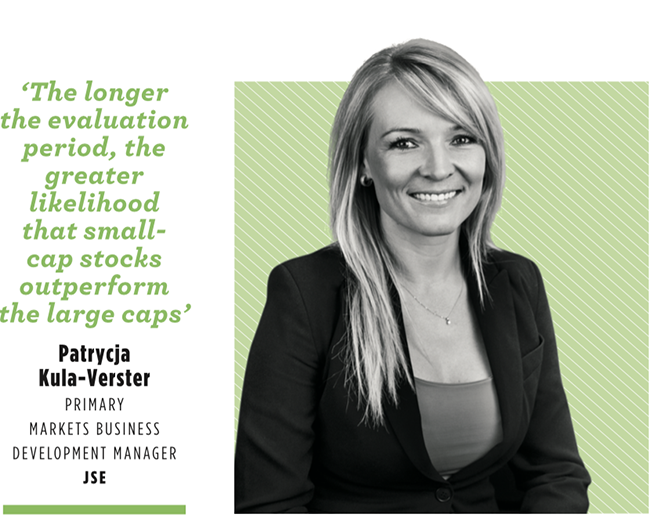Investors looking for decent returns, and those who have a higher risk tolerance, could look to invest in the small-cap businesses listed on the JSE, says Patrycja Kula-Verster, Primary Markets Business Development Manager at the JSE. ‘Small caps actually outperformed the FTSE/JSE All Share and FTSE/JSE Mid-cap indices in 2021, having realised a year-on-year growth of 51.85% compared to the All Share return of 24.07%, and the mid cap slightly under that at 24.05%. However, says Kula-Verster, rewards such as this are not always going to manifest.
‘Over time, small-cap stock prices tend to be more volatile than those of larger companies and, likewise, stock values fluctuate more dramatically. But, in general, the longer the evaluation period, the greater likelihood that small-cap stocks outperform the large caps.’
Small caps on the JSE have a market cap below R10 billion, and comprise 2.8% of the overall market cap. The industries are varied, with real estate and consumer discretionary businesses the most popular, followed by industrial, financial, basic materials, and consumer staples, with technology, energy, healthcare and telecoms at the lower end.
As an asset class, small-cap companies tend to be more growth oriented, but this means they require some extra consideration, says Kula-Verster. ‘Investors should be looking at a number of parameters when creating a shortlist of businesses for potential investment, including high-quality management; a history of consistent earnings; dividend growth; balance-sheet strength; proven cash generation; high barriers to entry; reasonable valuation; and strong earnings growth.
‘Further consideration should be given to “industry consolidators”, which are those companies that are buying up their market competitors and improving them; and “market leaders”, being those that carry the largest market share in their peer group. Then there is the “roll-out stories” aspect, relative to companies that are expanding either in phases or store-by-store, as well as niche businesses that satisfy a specific market need.’

The JSE plays a deeply supportive role to small-cap companies to ensure they aren’t lost among the investment considerations – and not just in terms of investor exposure and assessing regulation. ‘Our JSE Investor Services [JIS] arm has the aim to provide first-class customer service to investors while minimising issuer costs for the ongoing register management. JIS also presents investor-relations services and data analytics, which is a shareholder-analytics offering,’ she says. ‘The right ownership and shareholder data can accelerate growth and free up much-needed capacity of listed company executives and advisers, and past and current shareholders.’
Small-cap companies are advised to also tap into ShareHub, which facilitates electronic communication to shareholders through email boxes. ‘This is a huge cost saving,’ says Kula-Verster. Share plans, AGMs, training and custodial JIS services are also proving valuable to the asset class.
Yet another recent JSE initiative is the Small Caps Investment Forum, which offers small-cap companies an opportunity to discuss their growth strategies with investors. Broadcast via Business Day, six such listed companies showcased their businesses to investors and analysts, with JSE research proving that 2021 forum participants realised some increases in their liquidity/share price.
‘Analyst research is a great mechanism to improve issuer coverage,’ says Kula-Verster, which is why the JSE is constantly looking for ways that the bourse can better track and partner with the market to increase the coverage of these stocks. ‘The JSE also recognises the pressures these businesses face, and is constantly monitoring regulation to ensure small-cap companies can navigate through ongoing listing requirements so that they can focus on growing their businesses.’








